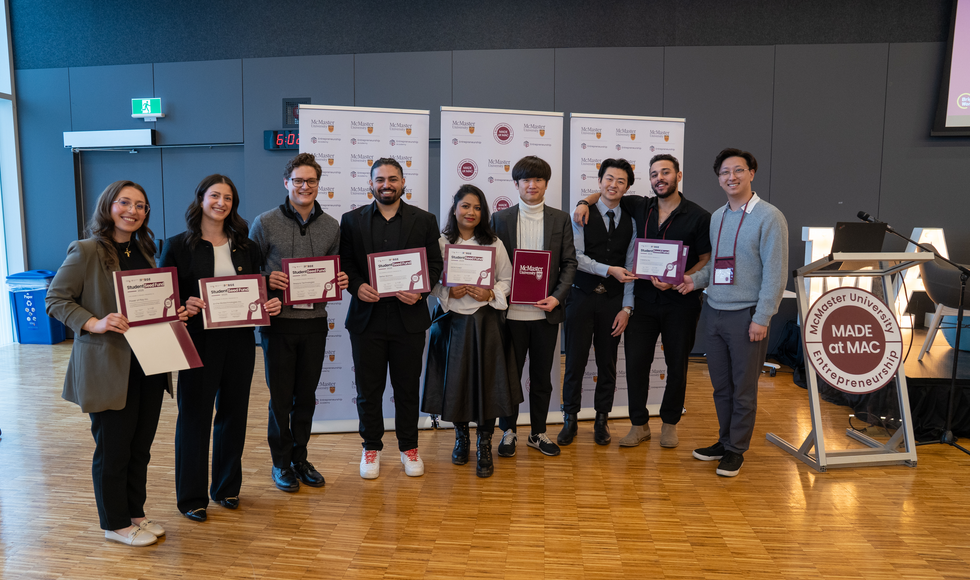Investor trainees select student winners of startup seed funding

Six student and alumni startups have been awarded $15,000 each through the new McMaster Student Seed Fund to advance their innovations ranging from AI-enabled reforestation to 3D-printed prosthetics.
Six student and alumni startups have been awarded $15,000 each through the new McMaster Student Seed Fund to advance their innovations ranging from AI-enabled reforestation to 3D-printed prosthetics.
Their judges? Fellow students from McMaster’s first cohort of Investor Analyst Fellows.
Sponsored by the McMaster Entrepreneurship Academy and The Forge, the new seed funding is available to students and recent alumni who have completed entrepreneurship programming at McMaster.
The Investor Analyst Fellowship is a 10-week part-time program in which 20 students learn venture capital (VC) fundamentals from experienced mentors. The first group of fellows applied their new skills by evaluating Student Seed Fund applications.
The two programs are designed to work together, expanding experiential learning opportunities within the innovation ecosystem, says Leyla Soleymani, McMaster’s associate vice-president, Research (Commercialization and Entrepreneurship).
“These programs – the first in Canada – are integral to our entrepreneurship training,” says Soleymani.
“What makes them unique is their synergy and how they come full circle — investor trainees apply their knowledge to fund student startups, creating a mutually beneficial and exciting experience.”
Sean Van Koughnett, associate vice-president, Students, and special advisor to the president on Innovation and Entrepreneurship, emphasizes the value of this experience for students.
“Entrepreneurship is more than just starting a business — it’s a mindset,” says Van Koughnett.
“Engaging in the process builds critical skills in teamwork, collaboration, and risk-taking — skills that remain valuable regardless of career path.”
Program participants worked for eight months with experienced entrepreneurs, lawyers, and accountants. The six winning ventures, announced at the second annual Made at Mac celebration of entrepreneurship, are:
- Arche | Founder Laura Venier
A smart sensor platform co-designed with nurses to improve fluid monitoring accuracy and enhance patient care. (It has also been awarded $10,000 through the Department of Medicine, the Marnix E. Heersink School of Biomedical Innovation and Entrepreneurship, and The Clinic.)
- Better Bionics | Founders Ahmed Ibrahim and Mohaimen Ibrahim
Uses AI to design personalized, 3D-printable prosthetics based on residual limb images, improving mobility and quality of life.
- Livesens |Founders Ali Hamdy, Eddy Su, and Jase Jin
Deploys mobile sensing units for real-time outdoor data collection, providing insights for smarter city planning.
- MiON Forest | Founders Anni Naharin Sultana and Sanghyun Kim
Innovates reforestation with biodegradable MiON Pots, AI-driven smart planting, and drone-assisted tree planting.
- Power of Play | Founders Deena Al-Sammak and Rooaa Shanshal
Develops a toy-like medical device that engages children in therapy by accurately measuring pediatric grip strength.
- Respyra | Founders Hunter Csetri, Emnpreet Bahra, Lily Zhong, and Esa Ahmad
Designs a medical device to assist clinicians with tube placement during difficult intubations, improving success rates and reducing complications.
“I was really inspired by the diversity in the skill set and backgrounds of the fellows, and the encouragement to listen to our guts and share our convictions,” said Fellow Ella Rice Hui, a third-year student in the Honours Health Sciences Program (HHSP).
“Learning to justify your opinion in a concise manner is a skill transferable beyond this program. I developed a lot of confidence.”
Hui’s prior experience is rooted in clinical research, and she was eager to explore new territory: The innovation and business applications of McMaster’s research.
PhD student Kyle Jackson, who has five years of experience in venture capital, trained the fellows on evaluating early-stage technology-based companies and guided them through their analysis of McMaster Student Seed Fund applicants.
“A standout moment in the program was witnessing how 20 individuals from diverse backgrounds coalesced into a team, rapidly absorbing the fundamentals of venture capital and applying that knowledge to assess real companies and deploy actual capital,” he says.
The IAF training equips students with skills needed to thrive in a VC career, he says.
“It sends a strong message to the McMaster startup community and the broader venture ecosystem: McMaster is a hub where startups can be built and scaled and where high-quality talent can be recruited to fill the diverse roles necessary for supporting innovative companies.”
Cameron Macdonald, a PhD student in drug delivery and one of three mentors in the IAF program, sees the seed fund as a boost to the broader VC ecosystem.
“VC firms are excited by programs like this, where students gain experience and knowledge, making them more investable,” Macdonald says.
“Supporting students in building companies and entrepreneurship is crucial for the Canadian technology ecosystem.”
The Investor Analyst Fellowship is part of the McMaster Startup Internships (MSI) program, established by the McMaster Entrepreneurship Academy with support from the Office of the President and the Marnix E. Heersink School of Biomedical Innovation and Entrepreneurship.
MSI operates in collaboration with The Forge Business Incubator and The Clinic Innovation Hub. IAF educational content development and program is supported by the MacPherson Student Partners Program (SPP) Winter 2025.


